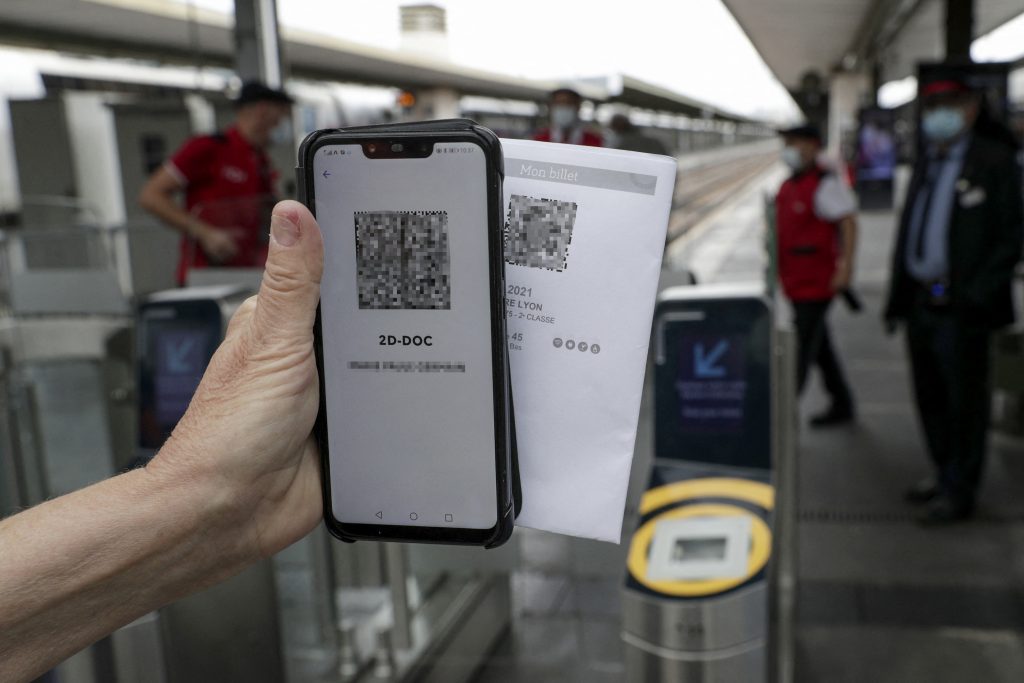The implementation of the French 'pass sanitaire' (health pass) in the summer of 2021 is estimated to have saved nearly 4,000 lives in France, shows a recent study by the Conseil d'analyse économique (CAE).
Health passes and vaccination certificates remain the subject of discussion (in Belgium too), but independent scientists from various universities and institutes found that France's sudden implementation of the pass not only saved thousands of lives but also saved €6 billion for the country's economy.
After France had already imposed strict measures (such as a 18:00 curfew), it was among the first European countries to require its 'pass sanitaire' to gain access to bars and restaurants. From August, it became mandatory for large shopping centres, cultural venues and long bus and train journeys.
Immediately after French President Emmanuel Macron announced on 12 July 2021 that the ‘pass sanitaire' would be made mandatory to enter bars, restaurants and museums, vaccination appointments surged as almost a million first shots were booked the next day.
Now, as the country tightened its rules again by replacing its "health pass" with a "vaccination pass," the Conseil d'analyse économique published a study, which has not yet been peer-reviewed, to show the impact of the 'pass sanitaire,' focused on vaccination coverage, hospitalisations and deaths due to Covid-19, as well as its economic consequences.
Nearly 4,000 lives saved
The researchers studied France, Germany and Italy, and while the impact of the introduction of such a health pass encouraged people to get vaccinated in all three countries, the biggest effect was found in France: between the day of Macron's announcement and the end of December, France's vaccination rate rose from 53.8% to 78.2%.
Without the pass, just 65.2% of the population would have been vaccinated, which is a difference of 13 percentage points. The study also noticed the impact in Italy (+9.7 percentage points) and Germany (+6.2), but the difference was less pronounced.
The difference is due to the difference in approach from the different countries, according to the researchers.
While Macron made clear announcements for the entire country, communication about the pass was less clear in Germany. Additionally, the rules were less strict and the implementation less centralised, said Miquel Oliu-Barton (Université Paris-Dauphine). "It was only when German communication became clearer and access to workplaces in the country was restricted by the pass, in November 2021, that a significant effect was observed," he told French press.
Without the pass, the number of hospital admissions would also have been about 31% higher in France, 5% higher in Germany and 15.5% higher in Italy. The researchers calculated that the pass saved 3,979 lives in France, 1,133 in Germany and 1,331 in Italy.
No forceful and clear approach in Belgium
In Belgium, Federal Health Minister Frank Vandenbroucke said on Flemish radio on Wednesday that the effect was so clear in France because they implemented their pass "forcefully and clearly," something which Belgium did not do. "It proves that when you do something so forceful and clear, it has a very strong effect: thousands of deaths have been avoided."
For Vandenbroucke, this forceful approach led many people to realise that it would be in the general interest for everyone to be vaccinated. "They thought, 'I will be vaccinated too, so I will not have any problems if I want to go to a bar or a cultural venue'," he said.
The big lesson is that vaccines on their own are not enough to protect everyone when a lot of virus is going around, "but vaccines are the key to all being safe," Vandenbroucke said. "The study showed that if we all want to be safe together, we all need to get vaccinated together."
While the Consultative Committee on Friday will likely discuss whether or not a booster dose will be needed to keep people's Covid Safe Tickets (CST) valid, Vandenbroucke said that the next step is narrowing the CST to only a vaccination certificate.
"If you ask me, we should just work with a vaccination certificate, and nothing else," he said, stressing that this is not something that will be on the table of the Consultative Committee this week, as it requires "a fundamental debate in parliament" first.
Personally, however, Vandenbroucke is in favour of such an approach. "The idea is simply — and I will keep repeating it — that everyone should be vaccinated. And that, I think, can be very clearly supported by such a certificate."

